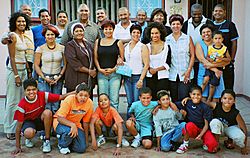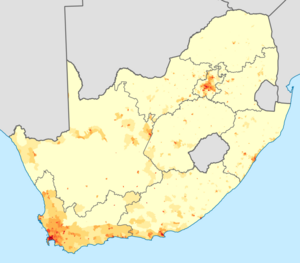Coloured facts for kids
 Extended coloured family with roots in Cape Town, Kimberley and Pretoria. |
|
| Total population | |
|---|---|
| (4,539,790 (2011; estimated)) | |
| Regions with significant populations | |
| South Africa (Western Cape and Northern Cape), Namibia, Zimbabwe | |
| Languages | |
| Afrikaans (75%) and English (25%) | |
| Religion | |
| Christian (90%), Muslim (<5%) | |
| Related ethnic groups | |
| Afrikaners, Cape Dutch, Cape Coloureds, Cape Malays, Khoikhoi, Xhosa, Indos, Saint Helenians |
In South Africa, Namibia, Zambia, Botswana, and Zimbabwe, the word Coloured (Kleurlinge in Afrikaans) describes people with mixed backgrounds. This means their families might have European, Khoisan, or Bantu roots.
Most Coloured people live in the Northern Cape and Western Cape provinces of South Africa. They form the largest group in these areas. Many speak Afrikaans as their main language. Some also speak English, especially those living in Cape Town.
Because of South Africa's past, some people feel the term "Coloured" is not fair. It reminds them of a time when people were treated differently based on their race. While "Coloured people" is an official term, many prefer to be called "Black," "Khoisan," or simply "South African."
Understanding Apartheid's Impact
Apartheid was a system in South Africa that separated people by race. It meant that people were treated differently based on their skin color. During this time, the government put people into four main groups: White, Black, Coloured, and Asian.
The Cape Malays, who have Asian family roots, were placed in the Coloured group. Even though Coloured people faced unfair treatment, they had some rights that Black people did not. For example, they were considered citizens of South Africa. They also had a small say in politics.
Important People and Places
Abdullah Abdurahman was a key leader during the apartheid era. He worked hard to fight for equal rights for all people. His efforts helped to challenge the unfair system.
Images for kids
See also
 In Spanish: Coloured para niños
In Spanish: Coloured para niños
 | Claudette Colvin |
 | Myrlie Evers-Williams |
 | Alberta Odell Jones |





